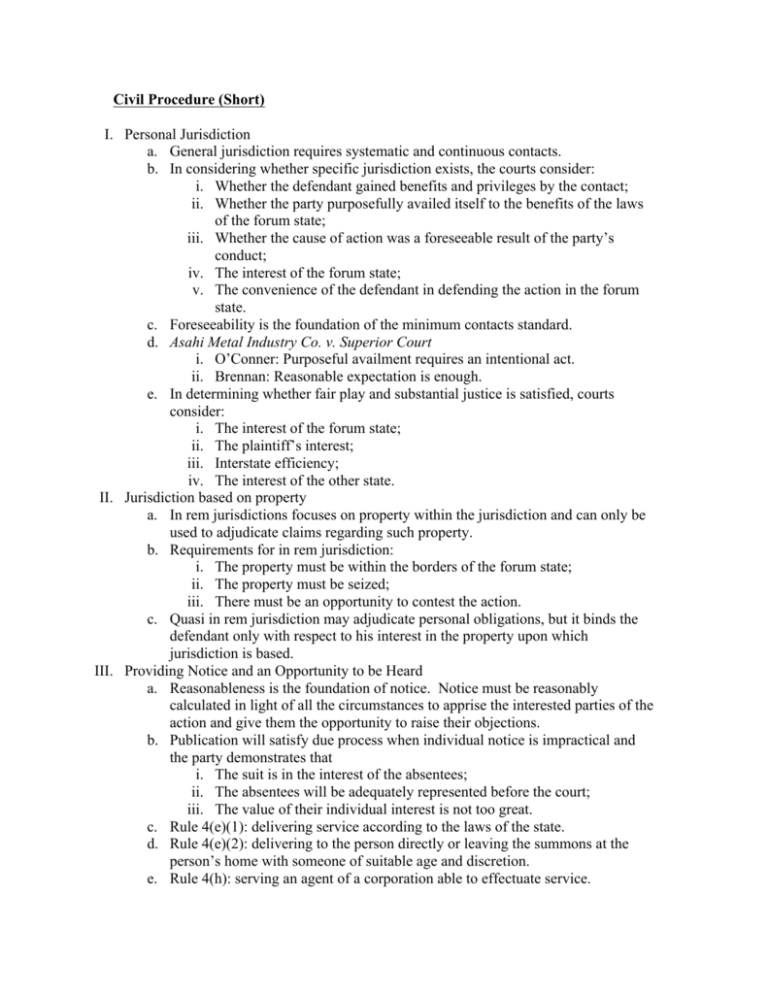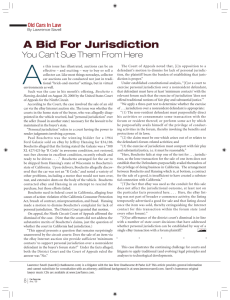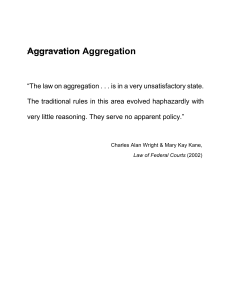Civil Procedure II Short Study Outline
advertisement

Civil Procedure (Short) I. Personal Jurisdiction a. General jurisdiction requires systematic and continuous contacts. b. In considering whether specific jurisdiction exists, the courts consider: i. Whether the defendant gained benefits and privileges by the contact; ii. Whether the party purposefully availed itself to the benefits of the laws of the forum state; iii. Whether the cause of action was a foreseeable result of the party’s conduct; iv. The interest of the forum state; v. The convenience of the defendant in defending the action in the forum state. c. Foreseeability is the foundation of the minimum contacts standard. d. Asahi Metal Industry Co. v. Superior Court i. O’Conner: Purposeful availment requires an intentional act. ii. Brennan: Reasonable expectation is enough. e. In determining whether fair play and substantial justice is satisfied, courts consider: i. The interest of the forum state; ii. The plaintiff’s interest; iii. Interstate efficiency; iv. The interest of the other state. II. Jurisdiction based on property a. In rem jurisdictions focuses on property within the jurisdiction and can only be used to adjudicate claims regarding such property. b. Requirements for in rem jurisdiction: i. The property must be within the borders of the forum state; ii. The property must be seized; iii. There must be an opportunity to contest the action. c. Quasi in rem jurisdiction may adjudicate personal obligations, but it binds the defendant only with respect to his interest in the property upon which jurisdiction is based. III. Providing Notice and an Opportunity to be Heard a. Reasonableness is the foundation of notice. Notice must be reasonably calculated in light of all the circumstances to apprise the interested parties of the action and give them the opportunity to raise their objections. b. Publication will satisfy due process when individual notice is impractical and the party demonstrates that i. The suit is in the interest of the absentees; ii. The absentees will be adequately represented before the court; iii. The value of their individual interest is not too great. c. Rule 4(e)(1): delivering service according to the laws of the state. d. Rule 4(e)(2): delivering to the person directly or leaving the summons at the person’s home with someone of suitable age and discretion. e. Rule 4(h): serving an agent of a corporation able to effectuate service. f. Rule 4(d)(2): incentives for waiving service g. Due process for prehearing seizure requires consideration of i. The interest affected; ii. The risk of erroneous depravation and the probable value of additional safeguards; iii. The applicant’s interest and fiscal and administrative burdens to the state. IV. Subject Matter Jurisdiction a. 28 U.S.C. § 1331: federal question jurisdiction b. 28 U.S.C. § 1332: diversity jurisdiction c. Citizenship for diversity means domicile. d. Domicile: a subjective intent to reside in the state permanently or indefinitely plus some physical presence in the state. e. United Mine Workers v. Gibbs three part test i. Plaintiff must assert a federal claim that has substance sufficient to confer subject matter jurisdiction on the court; ii. Freestanding and pendent claims must derive from a common nucleus of operative fact; iii. The federal and nonfederal claims must be such that the plaintiff would ordinarily be expected to try them all in one judicial proceeding. f. § 1367(a): supplemental jurisdiction for state claims that form one constitutional case with a federal law claim. g. § 1367(b): No supplemental jurisdiction if it would destroy diversity. h. § 1367(c): judicial discretion; four guideposts i. If the claims raise a novel or complex issue of state law where the state court would be better suited to decide the issue; ii. If the claims predominates claims over which the federal court has jurisdiction; iii. If the district court has dismissed all claims over which it had original jurisdiction, then the court has the discretion to dismiss the state law claim for no other reason than that it should be heard in state court; iv. There are exceptional circumstances, or other compelling circumstances, for declining jurisdiction. i. § 1367(d): statute of limitations j. § 1446: removal k. Forum defendant rule: diversity cases are removable only if none of the defendants is a citizen of the state in which the action is pending. l. The rule of unanimity m. § 1447(c) a motion to remand, except for subject matter jurisdiction, must be made within 30 days. n. Collateral attack: no justifiable issue of reliance plus i. The subject matter of the action was so plainly beyond the court’s jurisdiction that its entertaining the action was a manifest abuse of authority; ii. Allowing the judgment to stand would substantially infringe the authority of another tribunal or agency or government; or iii. The judgment was rendered by a court lacking capability to make an adequately informed determination of a question concerning its own jurisdiction and as a matter of procedural fairness the party seeking to avoid judgment should have the opportunity belatedly to attack the court’s subject matter jurisdiction. o. § 1391 i. Defendant’s residence: if there are multiple defendants, wherever any defendant resides, as long as all defendants are citizens of the same state; wherever the corporation is subject to personal jurisdiction. ii. Substantial part of events or property iii. Default: where any defendant is subject to personal jurisdiction for diversity cases, and where any defendant is found for federal question cases. p. To obtain dismissal for forum non conveniens, defendant must i. Demonstrate that an adequate forum is available; ii. Show that the considerations of the party and forum convenience override plaintiff’s choice. Considerations include: 1. relative ease of access to evidence; 2. availability of process for getting witnesses; 3. cost and efficiency; 4. minor: public interest and whether the forum would apply its own law or another. q. § 1404: intersystem transfer for convenience of parties and witness or the interest of justice. r. § 1406: a district court may transfer a case to any district court in which it could have been brought at the time of filing. V. Ascertaining the Applicable Law a. Where the issue is not grounded entirely on substantive or procedural policies but derives from both, the outcome-determinative test applies. b. When the issue invokes the Erie doctrine but is not adequately resolved by the substance-versus-procedure and outcome-determinative tests, the policies underlying both federal and state law are examined, with weight given to the policy of great importance. c. Two aims of Erie: i. Avoid forum shopping; ii. Reduce inequitable administration of the law. d. Hanna v. Plumer: federal procedural rules trump state law. e. The test for the imposition of federal common law i. The need for uniformity ii. Strength of a federal interest




